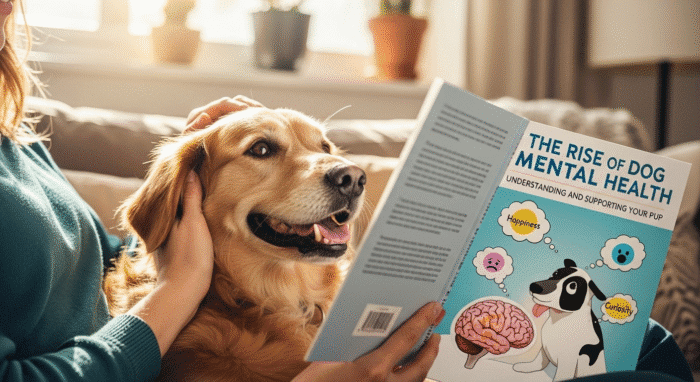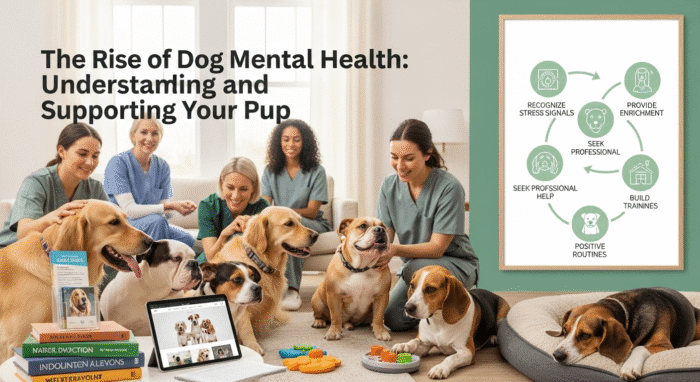Okay, let’s be real. For years, we’ve focused on the physical wellbeing of our dogs – the right food, plenty of exercise, regular vet visits. All essential, no question. But what about what’s going on inside that furry little head? I mean, they’re practically family, right? And we worry about our family’s mental state. So why not our dogs?
I initially thought it was just me, projecting my own anxieties onto my golden retriever, Gus (he’s a worrier, like his dad). But then I started noticing more and more articles, studies, and conversations about dog mental health. Turns out, it’s a real thing, and it’s on the rise.
The frustrating thing is that it’s a somewhat new field. Vets are getting more clued-up, but research is still playing catch-up. But, here’s the thing: ignoring your dog’s emotional wellbeing isn’t an option anymore. We owe it to them to understand and support their mental health, just as we do their physical health.
Table of Contents
Spotting the Signs: Is My Dog Struggling?

This is where it gets tricky. Dogs can’t exactly tell us they’re feeling down, can they? But there are definitely signs to watch out for. Think of it like this: if a usually playful dog suddenly becomes withdrawn and lethargic, or a normally calm dog starts exhibiting signs of anxiety, something might be up.
Changes in appetite are also a big indicator. Has your food-motivated Labrador suddenly lost interest in his kibble? That’s a red flag. Excessive barking, destructive behavior, or even aggression can also be signs of underlying mental distress. But – and this is important – it’s not always obvious. Sometimes it’s subtle shifts in body language or a general “off” feeling that only you, as their owner, might pick up on. Maybe your dog is having accidents inside. Here is more information on dog games.
And here’s a crucial point: don’t self-diagnose. Always consult with your vet or a qualified veterinary behaviorist. They can rule out any underlying medical conditions and provide a proper diagnosis and treatment plan. Remember that physical and mental health are often interconnected!
Common Culprits: What’s Causing Dog Anxiety?
Okay, so you’ve noticed some signs of distress. Now what? Understanding the potential causes can help you address the root of the problem.
Separation anxiety is a big one. Many dogs struggle when left alone, especially after spending more time with their humans during, say, a global pandemic. Loud noises – fireworks, thunderstorms – are another common trigger. Think about it from their perspective, these booms are really, really scary!
But sometimes, the causes are more complex. Changes in routine, new family members (human or animal), or even moving to a new home can all contribute to anxiety. Past trauma, such as abuse or neglect, can also have long-lasting effects on a dog’s mental health. I’ve got to admit, this part is something I didn’t think about for the longest time, the trauma that rescues can endure, you know? It really does shape their experience.
And let’s not forget the role of genetics. Some breeds are simply more prone to anxiety than others. Just like humans, some dogs are born with a predisposition to certain mental health conditions.
Think about your dog’s environment. Are they getting enough mental stimulation? A bored dog is often a stressed dog. Puzzle toys, training sessions, and even just a good old-fashioned walk can make a huge difference.
Practical Steps: Supporting Your Pup’s Emotional Wellbeing
So, what can you actually do to support your dog’s mental health? Well, it’s a multi-faceted approach. The first step is creating a safe and predictable environment. Dogs thrive on routine, so try to stick to a consistent schedule for feeding, walks, and playtime. Provide them with a comfortable and secure space where they can retreat when they’re feeling overwhelmed.
Positive reinforcement training is key. Focus on rewarding good behavior rather than punishing bad behavior. This builds trust and strengthens your bond with your dog. And speaking of bonds, make sure you’re giving them plenty of love and attention. A simple cuddle can do wonders for a dog’s emotional state. We should also be mindful of our planet, and eco-friendly dog products are something to look out for.
But – and this is a big but – don’t be afraid to seek professional help. A qualified veterinary behaviorist can assess your dog’s specific needs and develop a tailored treatment plan. This might include medication, behavior modification techniques, or a combination of both. According to Wikipedia, Animal behavior, is super important and we need to acknowledge this.
And remember, patience is key. Addressing dog mental health issues takes time and commitment. There will be ups and downs. But with the right support, your dog can live a happier, healthier, and more fulfilling life.
The Future of Dog Mental Wellness
I keep coming back to this point because it’s crucial: dog mental health is only going to become more important as we learn more. I initially thought X, but after looking deeper, I now think more preventative and proactive measures are the future. Think about it this way: future tools might include wearable tech to monitor stress levels in dogs, or even personalized mental health plans based on a dog’s genetic makeup! That sounds like sci-fi but it could be closer than we think!
Ultimately, the rise of dog mental health awareness signals a deeper shift in our relationship with our canine companions. We’re no longer just seeing them as pets, but as sentient beings with complex emotional lives. And that’s something worth celebrating.
FAQ: Dog Mental Health
How do I know if my dog is depressed or just having an off day?
That’s a great question, and one that many owners struggle with. Occasional moodiness is normal, just like it is for us. But persistent changes in behavior, such as loss of appetite, withdrawal from activities, or increased sleep, could indicate depression. If these symptoms last for more than a few days, it’s worth consulting with your vet.
What are some simple ways to reduce my dog’s anxiety at home?
Creating a calm and predictable environment is key. Provide a safe space, like a crate or bed, where your dog can retreat when feeling overwhelmed. Calming aids like pheromone diffusers can also help. And remember, a tired dog is a happy dog. Regular exercise and mental stimulation can work wonders!
Is there medication for dog anxiety, and are there side effects?
Yes, there are several medications that can help manage dog anxiety, ranging from anti-anxiety drugs to antidepressants. However, like any medication, they can have side effects. These can vary depending on the drug and the individual dog. It’s crucial to discuss the potential benefits and risks with your vet before starting any medication.
Why is The Rise of Dog Mental Health such a prominent concern now?
Several factors contribute to this increasing awareness. Firstly, we have a deeper understanding of animal behavior and cognition than ever before. Secondly, dogs are increasingly integrated into our families, and we’re more attuned to their emotional needs. Finally, there’s growing recognition that mental health is just as important as physical health, for both humans and animals.
Can a dog’s diet affect their mental health?
Absolutely! A poor diet can contribute to a range of health problems, including mental health issues. Deficiencies in certain nutrients can affect brain function and mood regulation. A balanced, high-quality diet is essential for overall wellbeing. Consider adding foods rich in Omega 3s. More info about healthy foods are provided here: Healthy Dog Food Recipes Your Pup Will Love
So, next time you’re pouring that kibble or heading out for a walk, remember to consider not just your dog’s physical needs, but their emotional wellbeing too. They depend on us to be their advocates, and that includes supporting their mental health.

